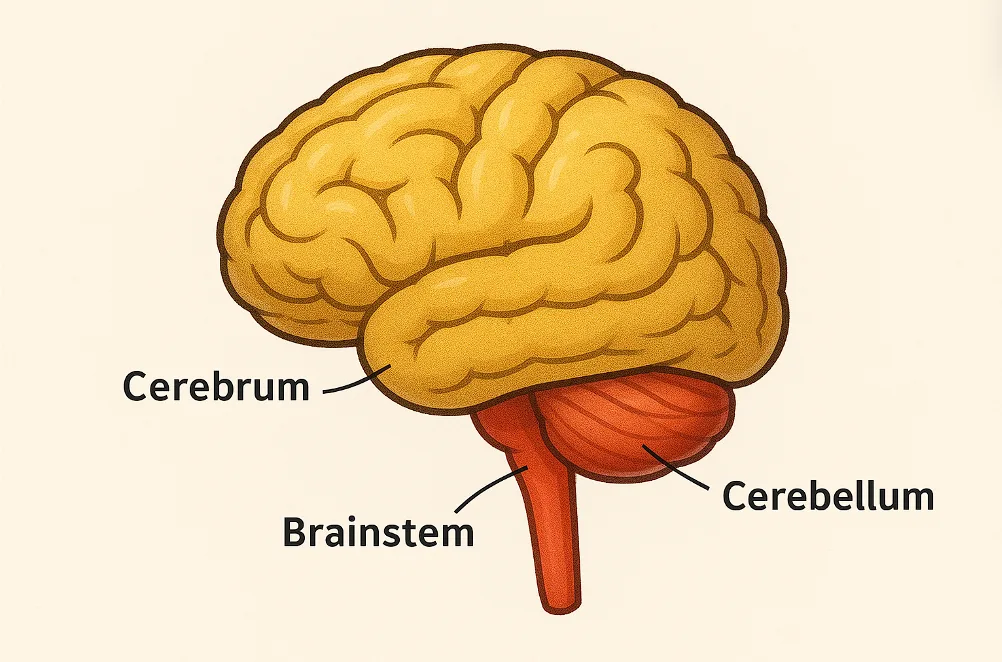How a 3-Pound Organ Controls Your Entire Body: Fascinating Brain Facts
Updated at: 16 January, 2026 by Brain's Quotient

In this article, we will explore ...
- Intro
- What Is the Human Brain?
- How Much Does the Brain Weigh?
- Does Brain Size Equal Intelligence
- How the Brain Controls the Body
- Key Functions of the Brain
- Surprising Brain Facts You Didn’t Know
- Conclusion
- Summary
- References
Introduction
The human brain weighs only about three pounds, yet it is the most powerful and complex organ in the body. Despite its small size, it controls every heartbeat, thought, movement, and memory. In this article, we’ll explore fascinating facts about the brain, how it works, and why brain size doesn’t equal intelligence.
What Is the Human Brain?
The human brain is the central control system of the body. It manages everything from basic survival functions like breathing and heart rate to complex processes such as problem-solving, emotions, and creativity. With 86 billion neurons and trillions of connections, it functions like a living supercomputer.
How Much Does the Brain Weigh?
On average, the adult human brain weighs around 1.3 – 1.4 kilograms (three pounds). Although relatively small compared to the rest of the body, the brain consumes nearly 20% of total energy at rest.
This means that even when you’re sitting still, your brain is constantly working—processing information, regulating body systems, and storing memories.
Does Brain Size Equal Intelligence?
- One common misconception is that a bigger brain equals greater intelligence. Science shows this is not true.
- Elephants and whales have larger brains than humans but are not more intelligent.
- Einstein’s brain was slightly smaller than average, yet his neuron density and brain structure made it highly efficient.
➡️ What matters most is neural efficiency and connectivity, not raw size.
How the Brain Controls the Body
The Three Key Brain Parts:
Show Image

- Cerebrum → reasoning, emotions, conscious thought
The largest part of the brain, the cerebrum is responsible for reasoning, emotions, language, memory, and conscious thought. It’s divided into left and right hemispheres, each controlling the opposite side of the body. The cerebrum also processes sensory information — letting you see, hear, touch, taste, and smell the world around you.
- Cerebellum → balance, coordination, motor skills
The cerebellum is the part of your brain located at the back of your head, just underneath the larger cerebrum. Its name means “little brain” (from Latin cerebellum), and it’s about the size of a fist. Despite its smaller size, it plays a huge role in your daily life: controlling balance, coordination, posture, and motor skills. Without the cerebellum, simple actions like walking, writing, or catching a ball would be clumsy and uncoordinated. It also helps fine-tune complex movements and supports motor learning — like when you practice riding a bike until it becomes second nature.
- Brainstem → breathing, heartbeat, digestion
The brainstem connects the brain to the spinal cord and handles the most vital, automatic functions that keep you alive: breathing, heartbeat, and digestion. Think of it as the body’s autopilot system — working quietly in the background so you don’t have to consciously remember to breathe or keep your heart pumping.
- Cerebrum → reasoning, emotions, conscious thought
Why This Matters
This constant communication — between cerebrum, cerebellum, brainstem, and the rest of the nervous system — is what makes the brain the ultimate control center of life. It manages everything from reflexes to creativity, from survival instincts to emotional depth. In short: your brain doesn’t just think, it runs the show.
Key Functions of the Brain
- 🧠 Cognition: thinking, problem-solving, and memory
- 😊 Emotion: processing and regulating feelings
- 🏃 Motor Control: directing movement and coordination
- ❤️ Autonomic Functions: heartbeat, breathing, digestion
- 🔄 Neuroplasticity: ability to rewire itself through learning
Surprising Brain Facts You Didn’t Know
- The brain has 100,000 miles of blood vessels.
- It’s made of 73% water—even mild dehydration can reduce focus.
- The cerebellum makes up only 10% of brain volume but holds half the neurons.
- A short walk increases blood flow to the brain, instantly boosting focus.
- Sleep helps the brain organize memories and learning.
Conclusion
The human brain may weigh just three pounds, but it is the master organ that controls every aspect of your life. From heartbeat regulation to creative thinking, the brain proves that size doesn’t equal power—complexity and connectivity do.
By caring for your brain with proper sleep, hydration, exercise, and nutrition, you can keep this small but mighty organ performing at its best.
Summary
- The brain weighs three pounds but controls the entire body.
- Size ≠ intelligence; neuron connections matter more.
- Neurons fire at 250 mph, enabling instant reactions.
- Key functions include cognition, emotion, motor control, and survival processes.
- A healthy lifestyle helps maintain peak brain performance.
